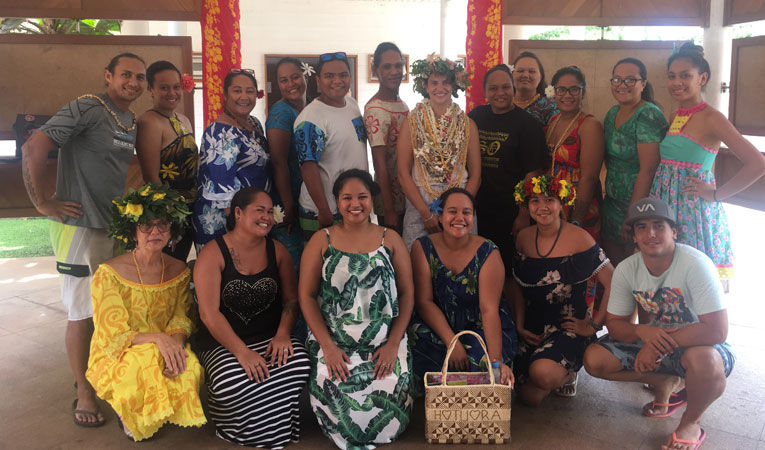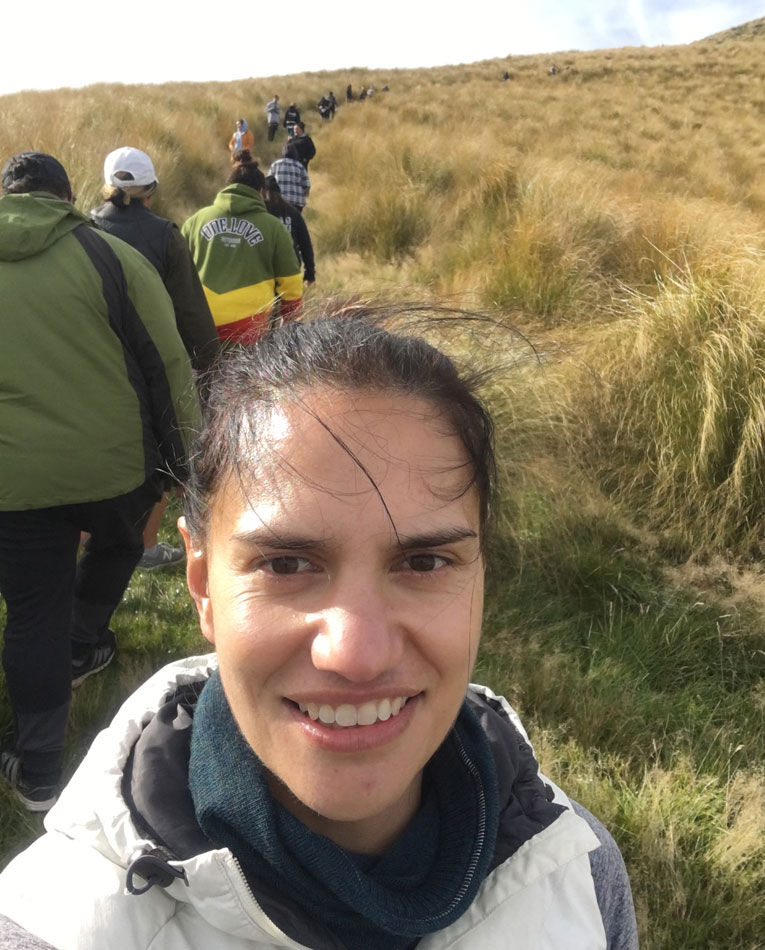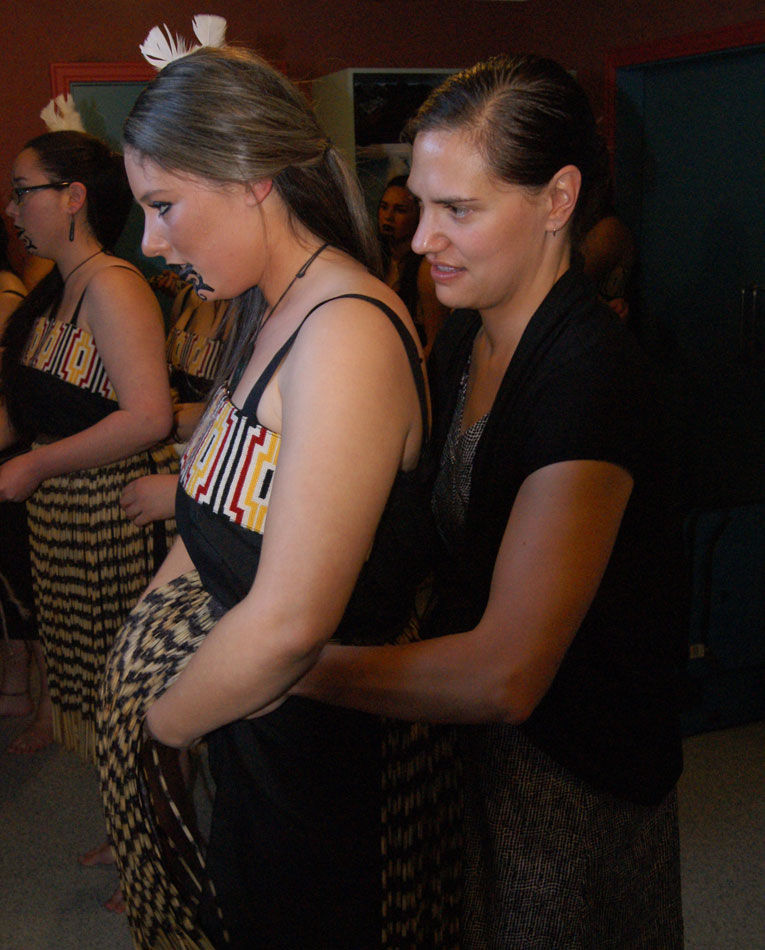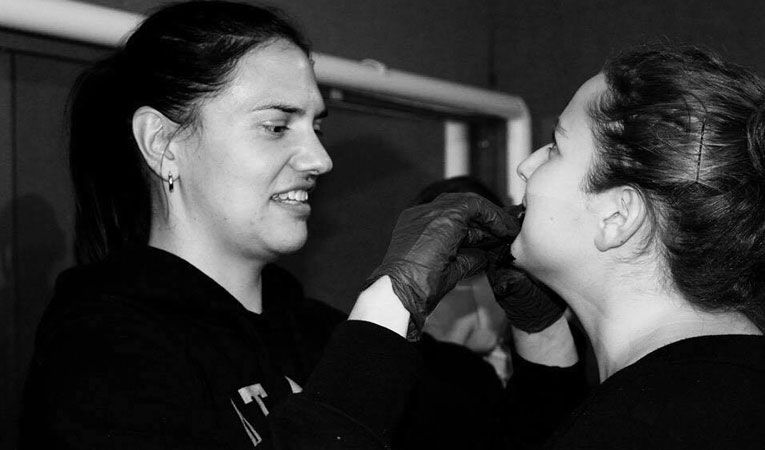Staff Interview with Karyn Paringatai
Get to know University of Otago's staff!

Karyn is a Senior Lecturer in Te Tumu where she teaches M?ori language, M?ori performing arts, and aspects of M?ori culture and society. My research interests are varied—M?ori urbanization and identity development, performing arts, grammatical aspects of the M?ori language and second language acquisition, and M?ori teaching methodologies—and they intersect at various points that contribute to the creation and dissemination of M?ori knowledge.
What inspired you to work for the University of Otago?
I work for people, not for an organization. My family, my communities, my students, my colleagues, my friends—they are my inspiration and I am fortunate to work in an institution that allows me to put them and their needs first.

Teaching in Tahiti
Describe a typical day at work.
I don't really have a "typical" day at work. My job varies—I could be teaching, in a meeting, formulating ideas for a journal article, composing a song, talking to students, attending seminars, organizing marketing campaigns, marking assignments all in the space of one day......and then the next day will look completely different. So many baskets to juggle, but variety is what keeps me coming back.
Why do you do what you do?
I do what I do for the advancement of Māori knowledge and to equip others with the desire, passion, and skills to carry on with this work when I am no longer here. There is no greater reason for me to do what I do than that.

Māori language students walking up Hikaroroa - get to know the place you are studying in
What is your favorite part of your job?
The flexibility of my job is my favorite part of working. I get to choose what I research, what I teach, and how I do both of these things. I can experiment with different ideas and test them out, and explore old ways and forms of knowledge and bring them into the now. I get to engage with so many people from all different walks of life and I always learn more from them than what I could ever teach them.
What challenges do you often face and how do you overcome them?
I go against every stereotype that exists of your typical academic/lecturer—I am young, female, educated, and Māori. I often felt invisible and on the periphery of academia, which has been a significant challenge over the years. I realized that I can't change their perception of me and I didn't want to change me just to fit in to "their" world. I realized that academia is "my" world too and I belonged here. I continued to be me, do things the way I wanted to do them, and stood my ground.
What are some current projects you are working on?
I'm a co-director of a University of Otago Research Theme called Poutama Ara Rau which looks at how Māori knowledge and Māori pedagogies can enhance tertiary student success. We are currently working on our book proposal to disseminate the ways in which that is done at my university.
I teach in the dark so I am always constantly looking at ways to enhance that practice and disseminate my research in that area. I am in the process of developing a book proposal on Māori forms of oral expressions with a colleague. Finally, I am also embarking on a new research pathway looking at the role of whakapapa (family histories) in genetic research and the lifesaving potential of whakapapa.
What makes the University of Otago special?
We recognize the potential of our students and we work extremely hard in our research to ensure that our students are getting first hand information and experiences. Our university supports and protects us and enables this to happen.

Helping a student tie her piupiu up before their concert assessment
What makes the University of Otago easy to market to potential participants?
Otago University is the only residential university in New Zealand. This means students live on campus. There is a real buzz and a unique vibe that comes from this—the students breathe life in to our university, and as a result they breathe life into us. We are invigorated by their return to campus and they make/force us to be current, relevant, and alert teachers and researchers. We are the leaders of many cutting-edge and innovative research in New Zealand and from this our students are getting the best there is.
What do you hope participants take away from programs at the University of Otago?
I hope they take away a global appreciation for the nuances of language and culture of Indigenous cultures around the work, and I know that we achieve this because they do because they tell me that that’s what they learn. I hope that they start to probe for understanding of what isn't immediately obvious to the naked eye.
Why do you think learning a new language is important?
As a Māori language and Māori performing arts teacher, there is nothing more important to me than encouraging others to learn a language. Language is tied up with culture—one thing would not survive without the other.
When you learn a language you are provided a glimpse in to the soul of another group of people. You learn why and how things are done and you become more holistic in your approach to life.

Applying a moko kauae to an international student before their concert assessment
What advice do you have for individuals thinking about going abroad?
Engage with the local people, learn their names, play with their children, and chat with their elders. They are the greatest source of information that you will be able to access to gain deeper insight about the country/city you are going to.
What does meaningful travel mean to you?
Meaningful travel to me means surrendering yourself to new ways of viewing the world. Nobody is ever going to look at and interpret it in the way that you do. But being open to other forms of knowledge will help you understand your own perceptions of yourself and others around you.

